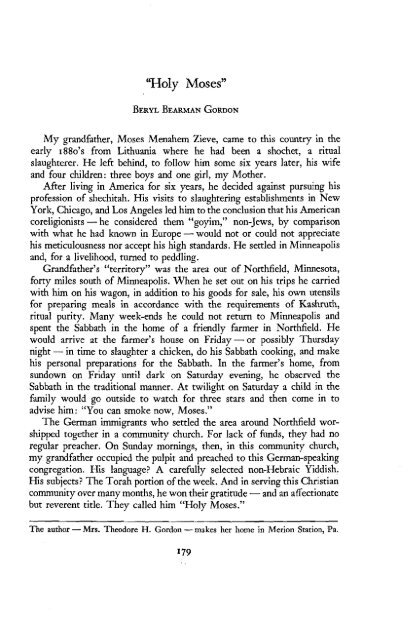American Tewish Archives - American Jewish Archives
American Tewish Archives - American Jewish Archives
American Tewish Archives - American Jewish Archives
You also want an ePaper? Increase the reach of your titles
YUMPU automatically turns print PDFs into web optimized ePapers that Google loves.
"Holy Moses"<br />
My grandfather, Moses Menahem Zieve, came to this country in the<br />
early 1880's from Lithuania where he had been a shochet, a ritual<br />
slaughterer. He left behind, to follow him some six years later, his wife<br />
and four children: three boys and one girl, my Mother.<br />
After living in America for six years, he decided against pursuing his<br />
profession of shechitah. His visits to slaughtering establishments in New<br />
York, Chicago, and Los Angeles led him to the conclusion that his <strong>American</strong><br />
coreligionists - he considered them "goyim," non-Jews, by comparison<br />
with what he had known in Europe - would not or could not appreciate<br />
his meticulousness nor accept his high standards. He settled in Minneapolis<br />
and, for a livelihood, turned to peddling.<br />
Grandfather's "territory" was the area out of Northfield, Minnesota,<br />
forty miles south of Minneapolis. When he set out on his trips he carried<br />
with him on his wagon, in addition to his goods for sale, his own utensils<br />
for preparing meals in accordance with the requirements of Kashruth,<br />
ritual purity. Many week-ends he could not return to Minneapolis and<br />
spent the Sabbath in the home of a friendly farmer in Northfield. He<br />
would arrive at the farmer's house on Friday- or possibly Thursday<br />
night - in time to slaughter a chicken, do his Sabbath cooking, and make<br />
his personal preparations for the Sabbath. In the farmer's home, from<br />
sundown on Friday until dark on Saturday evening, he observed the<br />
Sabbath in the traditional manner. At twilight on Saturday a child in the<br />
family would go outside to watch for three stars and then come in to<br />
advise him: "You can smoke now, Moses."<br />
The German immigrants who settled the area around Northfield wor-<br />
shipped together in a community church. For lack of funds, they had no<br />
regular preacher. On Sunday mornings, then, in this community church,<br />
my grandfather occupied the pulpit and preached to this German-speaking<br />
congregation. His language? A carefully selected non-Hebraic Yiddish.<br />
JXs subjects? -fie Torah portion of the week. And in serving this Christian<br />
community over many months, he won their gratitude - and an affectionate<br />
but reverent title. They called him "Holy Moses."<br />
The author - Mrs. Theodore H. Gordon - makes her home in Merion Station, Pa.<br />
I79

















